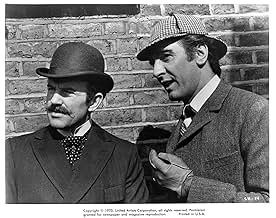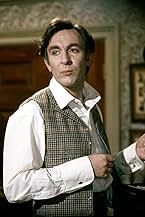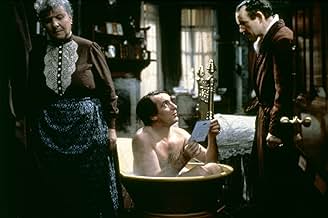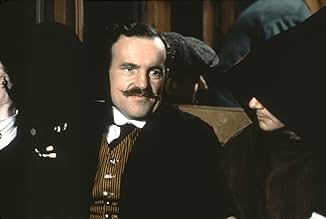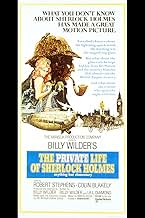La vie privée de Sherlock Holmes
Original title: The Private Life of Sherlock Holmes
- 1970
- Tous publics
- 2h 5m
IMDb RATING
7.0/10
14K
YOUR RATING
When a bored Holmes eagerly takes the case of Gabrielle Valladon after an attempt on her life, the search for her missing husband leads to Loch Ness and the legendary monster.When a bored Holmes eagerly takes the case of Gabrielle Valladon after an attempt on her life, the search for her missing husband leads to Loch Ness and the legendary monster.When a bored Holmes eagerly takes the case of Gabrielle Valladon after an attempt on her life, the search for her missing husband leads to Loch Ness and the legendary monster.
- Director
- Writers
- Stars
- Awards
- 3 nominations total
Geneviève Page
- Gabrielle Valladon
- (as Genevieve Page)
- Director
- Writers
- All cast & crew
- Production, box office & more at IMDbPro
Featured reviews
What American film makers have done to Sherlock Holmes from the 1970's onwards amounts to celluloid crime. They have inflicted upon us the risible 'Seven per cent solution' and the infantile 'Sherlock Holmes' Smarter Brother' to name but two. We have also had to endure portrayals of the Baker Street sleuth by George C. Scott, Charlton Heston, Robert Downey Jnr. Will Ferrel, Roger Moore, Michael Caine and more recently Ian McKellen as a Holmes with dementia. If that weren't enough we have had the animated 'Sherlock Gnomes' and now heaven help us, Sherlock Holmes' sister!
All of the above are too hideous to contemplate and it is with great relief that I come to Billy Wilder's 'satirical homage' to Conan Doyle's great creation.
Editor Ernest Walter was assigned the unenviable task of reducing the running time by more than half. The question is, did the loss of two stories make it less of a film? Judging by the extracts of 'missing scenes' on You Tube, I think 'not' but will no doubt be shot down in flames for saying so. The inclusion of those scenes would certainly have made it far more of a parody than is the surviving footage but what remains is parody enough in my opinion.
It is the strange mixture of irreverence and homage, satire and sadness that tends to hamper my enjoyment of it.
It begins very well and the scenes involving Imperial Ballet director Rogozhin, superbly played by Clive Revill, the Prima Ballerina Madame Petrova of Tamara Toumanova and the Holmes of Robert Stephens are masterful. We are then introduced to the enigmatic and fascinating Gabrielle Valladon played by the equally enigmatic and fascinating Genevieve Page. After that the film somehow loses focus and momentum and the later scenes in Inverness are distinctly lame and rather childish.
It is only since his death that we have learned how troubled a soul was actor Robert Stephens who reportedly attempted suicide during the making of this. His demeanor suits admirably the director's concept of Holmes as not just an analytical thinking machine but as a mere mortal with the same flaws and hang ups as the rest of us. Wilder's concept of Dr. Watson as an overgrown schoolboy is not really to my taste but Colin Blakely does well enough.
Certainly not to my taste is Christopher Lee as Mycroft. He has the unique distinction of having played Mycroft and Sherlock on film and both portrayals highlight his limitations as an actor. Apparently he was a last minute replacement for the inimitable George Sanders. What a pity.
Actress Mollie Maureen, through no fault of her own, is a grotesque caricature of Queen Victoria whilst the Scottish accent of Stanley Holloway as the gravedigger needs to be heard to be abhorred.
The melancholic, bitter sweet nature of the film is underlined by the music of maestro Miklos Rozsa. He has the taken the more lyrical elements of the Violin Concerto he wrote for Jascha Heifetz in 1956 and incorporated them into one of his greatest scores. Alexandre Trauner's production design is, as always, exemplary.
As one would expect from this director, the verbal takes precedence over the visual and textually reveals Wilder's undeniable respect for and knowledge of Conan Doyle's world.
This material was close to Wilder's heart and he could not fail to be wounded by the critical mauling it received and the total disinterest of cinema goers.
One is inclined to treat it kindly because it comes from Billy Wilder but despite its merits it must alas be considered a 'near miss' as indeed were his subsequent films.
Old directors never die, it is said. They just lose their sense of direction!
All of the above are too hideous to contemplate and it is with great relief that I come to Billy Wilder's 'satirical homage' to Conan Doyle's great creation.
Editor Ernest Walter was assigned the unenviable task of reducing the running time by more than half. The question is, did the loss of two stories make it less of a film? Judging by the extracts of 'missing scenes' on You Tube, I think 'not' but will no doubt be shot down in flames for saying so. The inclusion of those scenes would certainly have made it far more of a parody than is the surviving footage but what remains is parody enough in my opinion.
It is the strange mixture of irreverence and homage, satire and sadness that tends to hamper my enjoyment of it.
It begins very well and the scenes involving Imperial Ballet director Rogozhin, superbly played by Clive Revill, the Prima Ballerina Madame Petrova of Tamara Toumanova and the Holmes of Robert Stephens are masterful. We are then introduced to the enigmatic and fascinating Gabrielle Valladon played by the equally enigmatic and fascinating Genevieve Page. After that the film somehow loses focus and momentum and the later scenes in Inverness are distinctly lame and rather childish.
It is only since his death that we have learned how troubled a soul was actor Robert Stephens who reportedly attempted suicide during the making of this. His demeanor suits admirably the director's concept of Holmes as not just an analytical thinking machine but as a mere mortal with the same flaws and hang ups as the rest of us. Wilder's concept of Dr. Watson as an overgrown schoolboy is not really to my taste but Colin Blakely does well enough.
Certainly not to my taste is Christopher Lee as Mycroft. He has the unique distinction of having played Mycroft and Sherlock on film and both portrayals highlight his limitations as an actor. Apparently he was a last minute replacement for the inimitable George Sanders. What a pity.
Actress Mollie Maureen, through no fault of her own, is a grotesque caricature of Queen Victoria whilst the Scottish accent of Stanley Holloway as the gravedigger needs to be heard to be abhorred.
The melancholic, bitter sweet nature of the film is underlined by the music of maestro Miklos Rozsa. He has the taken the more lyrical elements of the Violin Concerto he wrote for Jascha Heifetz in 1956 and incorporated them into one of his greatest scores. Alexandre Trauner's production design is, as always, exemplary.
As one would expect from this director, the verbal takes precedence over the visual and textually reveals Wilder's undeniable respect for and knowledge of Conan Doyle's world.
This material was close to Wilder's heart and he could not fail to be wounded by the critical mauling it received and the total disinterest of cinema goers.
One is inclined to treat it kindly because it comes from Billy Wilder but despite its merits it must alas be considered a 'near miss' as indeed were his subsequent films.
Old directors never die, it is said. They just lose their sense of direction!
This is fun. It wouldn't be if it had strayed too far from the Holmes persona or if it were not a good movie. Holmes is a favorite from childhood, and odd take-offs on him are generally not appreciated. I have settled on the Jeremy Brett series as the definitive version, but enjoy others that are well done. To me, with remakes and other versions, if the piece is well done, it is not only acceptable but enjoyable. With remakes, I don't know what's worse - it being a general flop as a movie or their changing it all around and calling it the same thing. Sometimes, both happen. Usually, if you like the subject matter, you will probably like a good adaptation, if a bit more inventive that the source material. The Seven Percent Solution movie was well done and enjoyable.
I haven't seen a lot of Robert Stephens, but have appreciated what I have. I looked him up and found that this was pretty light fare for his experience. This is a quality portrayal by him, and the others do a good job as well. The overall production is pleasing. The Dr. Watson portrayal mystifies a bit, that here and in other things, they make him sort of ditsy. That doesn't fit the original stories, nor what Holmes' temperament would seem to tolerate as a companion or assistant with his careful work. Maybe it came from the early Rathbone series with Nigel Bruce. Whether intentional or not, he nearly always had a bumbler quality to his portrayal.
This is a worthy production in all aspects, which I would think garnered some critical approval at its time of release. I can see why it would take the public a while to adjust to seeing Sherlock Holmes as presented here. But, it speaks of the film's overall quality that it has aged well.
I haven't seen a lot of Robert Stephens, but have appreciated what I have. I looked him up and found that this was pretty light fare for his experience. This is a quality portrayal by him, and the others do a good job as well. The overall production is pleasing. The Dr. Watson portrayal mystifies a bit, that here and in other things, they make him sort of ditsy. That doesn't fit the original stories, nor what Holmes' temperament would seem to tolerate as a companion or assistant with his careful work. Maybe it came from the early Rathbone series with Nigel Bruce. Whether intentional or not, he nearly always had a bumbler quality to his portrayal.
This is a worthy production in all aspects, which I would think garnered some critical approval at its time of release. I can see why it would take the public a while to adjust to seeing Sherlock Holmes as presented here. But, it speaks of the film's overall quality that it has aged well.
Sherlock Holmes (Robert Stephens) and Dr. Watson (Colin Blakely) get involved in a very weird case involving a mysterious French woman (Geneuieve Page), Sherlock's brother Mycroft (Christopher Lee), midgets, Scotland, the Queen and the Loch Ness Monster! Believe it or not they all come together. I originally saw this on TV back in the late 70s but it was so heavily edited (for instance, the entire first half hour was gone because it dealt with gay characters which was still a taboo on TV back then) that I couldn't follow it and gave up. Now it's back on uncut and I'm glad I'm finally able to see it.
A very strange movie but lots of fun. Some people think this is a spoof. It really isn't but there are some very funny moments--my favorite is at the beginning when Holmes blasts Watson for how he writes about his cases--"Watson, I've never said 'elementary my dear Watson' in my life!""Poetic license Holmes". There's also quite a few funny one liners mostly delivered with great relish by Stephens and it does deal with the sexual relations of Holmes and Watson (it was hinted that they were gay lovers). But it does involve a very serious case and the jokes stop towards the end.
Stephens is actually very good as Holmes--he won't make you forget Basil Rathbone but he's not bad. Colin Blakely isn't as big a buffoon as Nigel Bruce was but he tends to overact a little. Page is just terrible as the mystery woman--but then again, English is her second language. Lee, surprisingly, is kind of stiff as Mycroft. He's a very good actor--I'm surprised to see him so bad.
The movie is very lavish (probably because Billy Wilder was involved)...a lot of money and attention was given to sets and costumes, and they actually went on location to shoot the end in Scotland. The cinematography is just beautiful and the movie was never dull. It doesn't always mix the comedy with the drama successfully but it works more often than it misses. As most people know this was HEAVILY edited before it was released and the uncut version doesn't seem to exist anymore. That's too bad but what remains is not bad. Worth catching...a must see for Holmes fans.
A very strange movie but lots of fun. Some people think this is a spoof. It really isn't but there are some very funny moments--my favorite is at the beginning when Holmes blasts Watson for how he writes about his cases--"Watson, I've never said 'elementary my dear Watson' in my life!""Poetic license Holmes". There's also quite a few funny one liners mostly delivered with great relish by Stephens and it does deal with the sexual relations of Holmes and Watson (it was hinted that they were gay lovers). But it does involve a very serious case and the jokes stop towards the end.
Stephens is actually very good as Holmes--he won't make you forget Basil Rathbone but he's not bad. Colin Blakely isn't as big a buffoon as Nigel Bruce was but he tends to overact a little. Page is just terrible as the mystery woman--but then again, English is her second language. Lee, surprisingly, is kind of stiff as Mycroft. He's a very good actor--I'm surprised to see him so bad.
The movie is very lavish (probably because Billy Wilder was involved)...a lot of money and attention was given to sets and costumes, and they actually went on location to shoot the end in Scotland. The cinematography is just beautiful and the movie was never dull. It doesn't always mix the comedy with the drama successfully but it works more often than it misses. As most people know this was HEAVILY edited before it was released and the uncut version doesn't seem to exist anymore. That's too bad but what remains is not bad. Worth catching...a must see for Holmes fans.
I only found out recently that the film was heavily cut. Two whole missing sections - The Curious Case of the Upside Down Room and The Case of The Naked Honeymooners never made it to the theatrical release, as well as a couple of other small sections. Where the hell are they? In these days of extended editions, DVD extras, etc, this would be a perfect chance to show Billy's film as he had intended. Touch of Evil was re-cut to Welles original specification recently, so it is possible - providing you still have access to the material. Even if it is too long - a reported 3 hours and twenty minutes - I'd like the chance to make my own mind up.
The film itself is still of interest. Performances are good, it is atmospheric, both visually and musically and the humour not too out of place. The homosexual/misogyny angle is of particular interest and one of the main reasons why Billy set out to try and make a Sherlock Holmes picture in the first place. Many of Billy's films carry these themes, of course, but Holmes mysterious quality leant itself to this interpretation. And so what? He may be in the closet, but he still falls for Gabrielle Valadon. And the end...very touching, beautifully handled.
The film itself is still of interest. Performances are good, it is atmospheric, both visually and musically and the humour not too out of place. The homosexual/misogyny angle is of particular interest and one of the main reasons why Billy set out to try and make a Sherlock Holmes picture in the first place. Many of Billy's films carry these themes, of course, but Holmes mysterious quality leant itself to this interpretation. And so what? He may be in the closet, but he still falls for Gabrielle Valadon. And the end...very touching, beautifully handled.
This film is sometimes described as a comedy, and while it has humorous bits (a more sardonic and biting form of humour most of the time), it has never really felt at home being classified as a comedy, in my estimation. I do like the rapid-fire wit that Holmes seems to have here (a bit more in abundance than in the canonical Conan Doyle stories), but the Holmes presented here is a bit more dark and brooding, more akin to the extra-canonical 'Seven Percent Solution' Holmes in many ways.
Wilder was an extraordinary director and genius who sometimes gets carried away with his subject (in this regard, he is sometimes compared with Stanley Kubrick). His films are often of epic-proportions, even though they are not essentially 'epic' subjects. This film is reputed to have been nearly twice as long as the final cut version, but this may be apocryphal in that much of the raw footage never made it to final print and production. The restoration available on the disc currently available is, in fact, rather minimal - a few scenes and a few extras, but not much more than the original release of the film. This is disappointing to many fans, but in fact is more than most of us have had for a long time, as the somewhat choppy film was often mercilessly cut for television broadcast.
Holmes in this case is played by Robert Stephens, an unlikely Holmes in comparison to standards such as Rathbone, Brett, or Gillette, but still an interesting choice - quintessentially British, reserved but daring, brilliant yet flawed and faltering. Colin Blakely presents a stronger Watson than often portrayed before (this film, being made in 1970, presented this as a newer idea for Watson, one that has been picked up by many subsequent productions). Wilder has the actors play at various issues of Victorian sensibility and morality, including the implication (dismissed in the end) that Holmes might have a sexual identity issue. Christopher Lee, who himself plays Holmes in other productions, plays Holmes' smarter brother Mycroft here, to good effect.
The story line does have some inspiration from the canonical stories (the Bruce-Partington Plans, for one), and from Gillette's play (the strange case of Miss Faulkner, introducing an ending that allowed for a love interest for Holmes in the end), but for the most part takes the characters from Conan Doyle and runs far afield. Still, this is must-see film for any fan of Holmes, and any fan of Wilder, who saw this as one of his last great productions.
Wilder was an extraordinary director and genius who sometimes gets carried away with his subject (in this regard, he is sometimes compared with Stanley Kubrick). His films are often of epic-proportions, even though they are not essentially 'epic' subjects. This film is reputed to have been nearly twice as long as the final cut version, but this may be apocryphal in that much of the raw footage never made it to final print and production. The restoration available on the disc currently available is, in fact, rather minimal - a few scenes and a few extras, but not much more than the original release of the film. This is disappointing to many fans, but in fact is more than most of us have had for a long time, as the somewhat choppy film was often mercilessly cut for television broadcast.
Holmes in this case is played by Robert Stephens, an unlikely Holmes in comparison to standards such as Rathbone, Brett, or Gillette, but still an interesting choice - quintessentially British, reserved but daring, brilliant yet flawed and faltering. Colin Blakely presents a stronger Watson than often portrayed before (this film, being made in 1970, presented this as a newer idea for Watson, one that has been picked up by many subsequent productions). Wilder has the actors play at various issues of Victorian sensibility and morality, including the implication (dismissed in the end) that Holmes might have a sexual identity issue. Christopher Lee, who himself plays Holmes in other productions, plays Holmes' smarter brother Mycroft here, to good effect.
The story line does have some inspiration from the canonical stories (the Bruce-Partington Plans, for one), and from Gillette's play (the strange case of Miss Faulkner, introducing an ending that allowed for a love interest for Holmes in the end), but for the most part takes the characters from Conan Doyle and runs far afield. Still, this is must-see film for any fan of Holmes, and any fan of Wilder, who saw this as one of his last great productions.
Did you know
- TriviaBy the time of filming, Sir Christopher Lee had become famous as Count Dracula. When he and Billy Wilder walked on the shores of Loch Ness at dusk, with bats circling overhead, Wilder said to him, "You must feel quite at home here."
- GoofsThe events start in August 1887 and apparently take place in the following weeks or, at most, months. However, Mycroft Holmes tells Queen Victoria that Kaiser Wilhelm II had Count Zeppelin working on dirigibles that could drop bombs on Buckingham Palace. Wilhelm II did not become Kaiser until 15 June 1888, and Zeppelin did not start constructing rigid airships until the 1890s.
- Alternate versionsOriginally released at 125 minutes; the US laserdisc version adds 12 minutes of unreleased footage, including a sequence known as "The Dreadful Business of the Naked Honeymooners", featuring Jonathan Cecil and Nicole Shelby
- ConnectionsFeatured in The Many Faces of Sherlock Holmes (1985)
- SoundtracksConcerto for Violin and Orchestra Opus 24
by Miklós Rózsa
Details
- Release date
- Countries of origin
- Languages
- Also known as
- The Private Life of Sherlock Holmes
- Filming locations
- Production companies
- See more company credits at IMDbPro
Box office
- Budget
- $10,000,000 (estimated)
- Gross worldwide
- $19,930
Contribute to this page
Suggest an edit or add missing content


